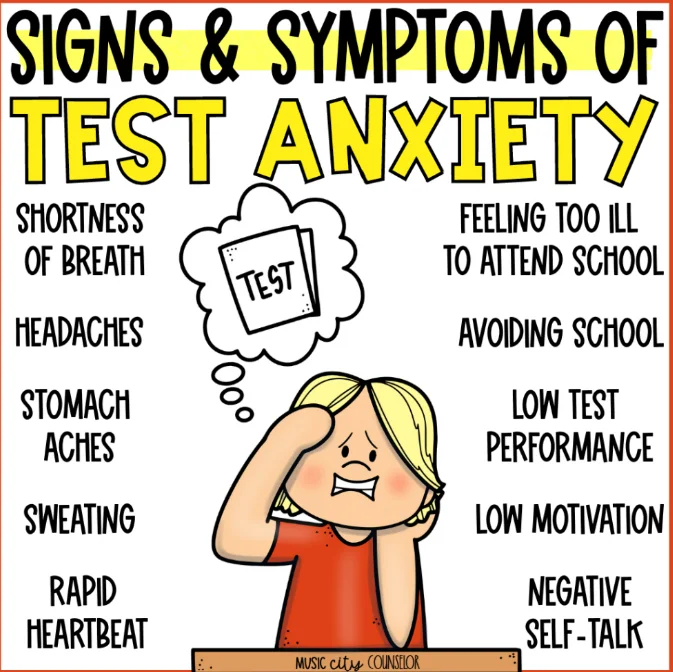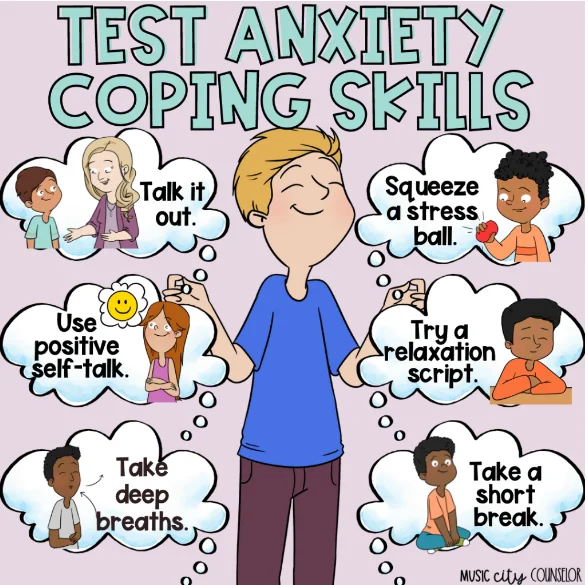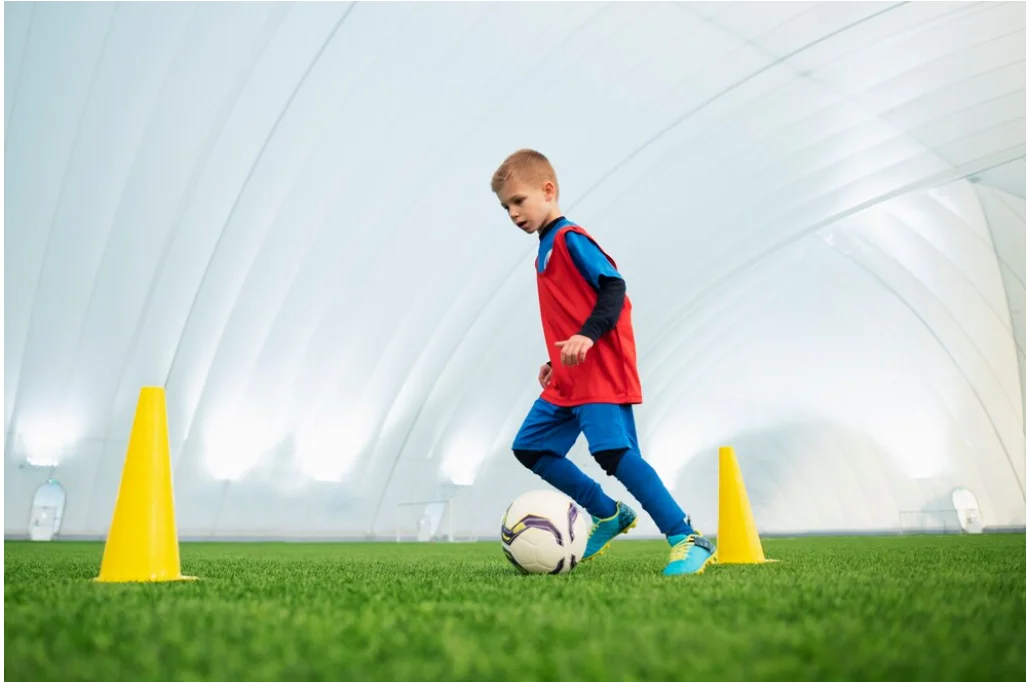Update: This article was last updated on 27th December 2023 to reflect the accuracy and up-to-date information on the page.
Anxiety in children? Yes, children also have anxiety. Mostly they experience anxiety either before or during a test. Test anxiety symptoms include headaches, shortness of breath, and difficulty concentrating.
Researchers describe exam anxiety as “a physiological condition in which people experience extreme stress, anxiety, and discomfort before, during, or after taking a test.”
They suggest that 25% to 40% of American students commonly experience test anxiety. It further states that certain exams, like standardized examinations, trigger more anxiety than routine in-class evaluations.
Test-anxious children frequently have an unreasonable dread of failing their tests, according to experts, but they might not communicate these concerns to their parents.
The executive director of the UCLA Child Anxiety Resilience Education and Support Center, Kate Sheehan, notes that parents are sometimes “quite in the dark” and that instructors may notice problems long before parents do.
Here are some crucial tips to remember to assist in managing test anxiety if you think your child is among the many who suffer from it.
How to Recognize Test Anxiety

Many of the symptoms of anxiety in general and test anxiety in particular are related to exams, but they are not the same.
Clinical director of psychological services at Manhattan Psychology Group in New York, Francyne Zeltser, points out that test anxiety is a very subjective experience, with different children exhibiting different symptoms.
“We see the physical symptoms of anxiety very often: the child may be hyperventilating, their body may be tense, their heart may be racing,” she explains.
“At other times, you’ll witness more of the silent suffering, where people may seem distracted on the outside but are going through a lot on the inside.”
Erainna Winnett, the author of “Outsmart Test Anxiety” and a former elementary school counselor in Texas, said that while younger kids might not be able to articulate their inner battle, they probably could express the symptoms they’re feeling physically.
Sheehan continues, “Teachers may notice that a child appears more tense or even jittery during an exam.”
Understanding the Enemy:

- Physical Symptoms: Recognize the warning signs – stomachaches, headaches, fatigue, and even panic attacks.
- Cognitive Distortions: Negative self-talk (“I’m going to fail,” “Everyone else is smarter”) fuels anxiety and hinders performance.
- Perfectionism: The relentless pursuit of flawlessness can be paralyzing, leading children to avoid challenges and downplay their abilities.
Building Strategies for Success:

- Preparation is Key: Effective Study Habits: Encourage focused and organized studying, tailoring methods to individual learning styles. Practice tests can build confidence and expose areas needing attention.
- Sleep and Routine: A good night’s sleep and a healthy morning routine prime the mind and body for optimal performance. Avoid sugary breakfasts and opt for brain-boosting foods like eggs and berries.
- Positive Self-Talk: Combat negative thoughts with realistic and encouraging affirmations. “I’ve studied hard and I’m ready to do my best” can replace the voice of doubt.
10 Ways to Help Kids Cope with Test Anxiety
1. Create a supportive environment

Creating a supportive environment is key to helping children cope with test anxiety. By fostering an atmosphere that prioritizes a growth mindset–where mistakes are seen as opportunities for learning, we can boost their confidence and reduce anxiety.
When children feel supported and valued for their efforts, they are more likely to approach tests positively and perform at their best.
2. Teach relaxation techniques

Teaching relaxation techniques equips children with valuable lifelong skills to manage not only test anxiety but also stress in various aspects of their lives.
By introducing practices such as deep breathing exercises, mindfulness, or guided imagery, we can provide them with valuable tools to calm their minds and bodies before and during tests.
💪Pro Tip: Teach your kids the art of deep breathing anytime and anywhere. This simple technique can also help them regain focus and clarity during the exam.
Recommended Reading: 5 WAYS TO MAKE HOMEWORK FUN FOR YOUR CHILD
3. Encourage smart study habits

Help your kids develop strategies that make learning approachable. For instance, breaking down material into smaller, manageable chunks will make studying more manageable.
Similarly, utilizing mnemonic devices can provide clever ways to remember important information. According to Gerald R. Miller, a notable author in communication studies, students who regularly used mnemonic devices increased test scores by 77%.
4. Promote regular exercise

When children engage in physical activities, such as running, dancing, or playing sports, their bodies release endorphins, which are neurotransmitters associated with feelings of pleasure and well-being.
These endorphins act as natural mood enhancers and stress relievers, effectively reducing anxiety and tension in students.
💪Pro Tip: Give your kids the freedom to choose their preferred physical activities. It encourages them to stay active and develop healthy habits, leading to a more enjoyable and sustainable fitness journey.
5. Provide a balanced diet

A healthy diet provides essential nutrients that support optimal brain function and development. Foods rich in vitamins, minerals, and antioxidants, such as fruits, vegetables, whole grains, lean proteins, and healthy fats, nourish the body and mind.
By providing children with a well-rounded diet, we fuel their bodies with the necessary nutrients to sustain energy levels throughout the day, enhancing their ability to concentrate, stay focused, and perform academically.
6. Teach time management skills

Help children learn effective time management skills to avoid feeling overwhelmed by last-minute cramming. By guiding them in learning effective time management techniques, such as creating study plans and prioritizing tasks, we can empower them to take control of their workload.
💪Pro Tip: Certain project management tools can help them plan their study periods and set realistic deadlines to reduce overwhelm.
7. Encourage positive self-talk

Teach children to replace negative thoughts and self-doubt with positive affirmations. It helps to remind them of their strengths and past successes so they don’t lose confidence during challenging events.
Two daily affirmations that you can try with your kids:
- “I am capable, resilient, and prepared for success. I trust my abilities and have the knowledge and skills needed to perform better.”
- “My worth is not defined by test scores. My true value lies in my unique strengths, talents, and character.”
8. Provide mock exams and practice tests

At home, give them mock exams and practice tests because it is an effective way to familiarize children with different test formats.
By experiencing test-like conditions, children become more comfortable with the exam environment, instructions, and time constraints.
Regular exposure to practice tests builds confidence, minimizes the fear of the unknown, and equips children with the necessary strategies to approach actual exams with greater ease and composure.
9. Seek support from educators and counselors

Encourage your children to contact their teachers or school counselors for guidance and support. These professionals can offer valuable insights, provide additional resources, and suggest personalized strategies to address test anxiety.
Educators at schools and colleges often offer designated office hours that students can use. These office hours provide valuable opportunities for students to seek guidance, ask questions, and receive personalized support.
💪Pro Tip: Students can also schedule Zoom meetings with their teachers if they cannot meet during regular office hours.
Recommended for reading: TOP 12 BRAIN-BASED LEARNING ACTIVITIES FOR KIDS IN 2023
10. Be Their Support

Last, support your kids unconditionally, regardless of their academic performance. By providing a supportive and non-judgmental environment, you can alleviate text anxiety.
This can be done by encouraging open communication, emphasizing effort over outcomes, and celebrating progress rather than solely focusing on grades. When kids feel supported and loved, they are more likely to confidently approach exams, view them as opportunities for growth, and develop resilience in the face of challenges.
Remember:
- Focus on Effort, Not Outcome: Emphasize the value of hard work and dedication, not just the score. Celebrating effort reinforces a positive learning mindset and reduces pressure.
- Normalize Anxiety: Let your child know that test anxiety is common and they are not alone. Sharing your own experiences (if appropriate) can build empathy and comfort.
- Celebrate Success: Recognize and celebrate your child’s achievements, big or small. This builds confidence and motivates them to tackle future challenges.
By combining understanding, preparation, and practical strategies, we can help our children navigate the sometimes turbulent waters of test anxiety and emerge triumphant. Let’s equip them with the tools they need to conquer their fears and shine in the academic arena!
Conclusion
Remember, each child is unique, and it’s essential to tailor these strategies to their specific needs and preferences. By implementing these approaches, parents and educators can help children develop effective coping mechanisms for test anxiety.
Moonpreneur is on a mission to educate and ignite the flames of entrepreneurship through our holistically created online STEM programs, which will help kids master the futuristic sciences such as Robotics, Game Development, App Development, Advanced Math, Math-Quiz to test your kids knowledge and much more!!
Register for a free 60-minute robotics workshop today!

















Calming technique of using a stress ball helped my son in the past. I learned that taking extra time or a break partway
Always encourage kids to remember that it’s okay if they don’t know the answer.